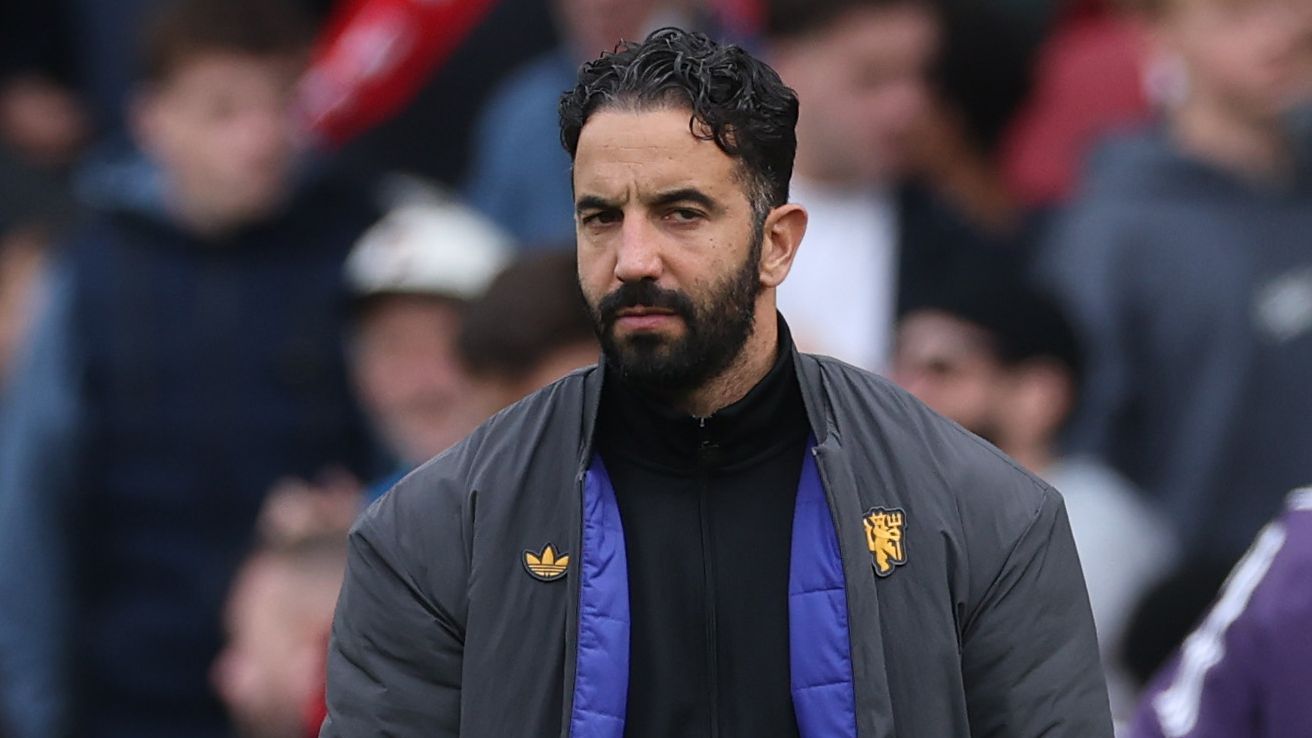


Amorim’s Deep Disappointment Following Manchester United’s Stumble Against Brentford
In a display of raw emotion, Ruben Amorim and Manchester United faced yet another setback in the Premier League, highlighting ongoing defensive lapses and missed chances. This match not only exposed tactical flaws but also intensified scrutiny on the team’s direction under their current leadership.
Breakdown of the Game’s Pivotal Moments
Early in the contest, Manchester United‘s defense faltered, allowing opponents to capitalize quickly. Igor Thiago netted twice in the opening 20 minutes, exploiting the team’s disorganized backline to take control. Moments later, Benjamin Sesko managed to equalize with his first goal for the squad in the 26th minute, injecting a spark of hope into the encounter. Yet, the tide turned again when Bruno Fernandes, the team’s captain, failed to convert a penalty in the latter half, paving the way for Mathias Jensen to deliver the decisive blow in the 95th minute, securing a vital win for the opposition.
Analysis of Defensive Errors and Opportunities
Throughout the match, Manchester United‘s inability to handle long passes and set pieces proved costly, turning practiced strategies into vulnerabilities. These errors echoed a pattern of inconsistency that has plagued the team’s performances, emphasizing the need for sharper execution in high-pressure scenarios.
Insights from Ruben Amorim’s Post-Match Comments
After the final whistle, a clearly upset Ruben Amorim shared his thoughts with TNT Sports, pointing out specific weaknesses in the team’s preparation. He noted, “The initial play came from a lengthy pass right after regaining possession. That’s something we covered in training. We also focused on set pieces, but they turned those into chances just as we’d anticipated, and the outcomes mirrored our drills. We must improve.”
Reflections on Team Control and Strategy
Expanding on his frustration, Amorim remarked, “The sensation remains consistent. Naturally, victory is our goal. In my view, we failed to dictate the pace. We ended up following Brentford’s style, leading to confusion on first contacts, second balls, and dead-ball situations. Every key instance went against us. It’s challenging to face another loss, yet we have to shift focus to the upcoming challenge.”
Fan Sentiment and Escalating Scrutiny on the Manager
At the Gtech Community Stadium, the local crowd voiced their displeasure with chants directed at Ruben Amorim, such as “You’re getting sacked in the morning!” as the Manchester United coach appeared disheartened on the bench during the league fixture.
The Growing Challenges for the Portuguese Coach
As Manchester United‘s struggles persist in the Premier League, demands on Amorim are reaching a critical point. He retains backing from the club’s executives for now, but his role could be at risk without significant enhancements. Should the team opt for a mid-season change, they would face a substantial financial outlay in termination costs.
Key Moments from Manchester United’s Defeat to Brentford
Ruben Amorim’s frustrations have been a hot topic among football fans and analysts following Manchester United’s disappointing 2-1 loss to Brentford. This defeat highlighted ongoing challenges for the team under Amorim’s leadership, as key mistakes and missed opportunities piled up during the match. If you’re a Manchester United supporter or just interested in Premier League drama, understanding these frustrations can offer deeper insights into the pressures of managing a high-stakes club like United.
The game, which took place at the Gtech Community Stadium, saw Brentford capitalize on United’s defensive lapses early on. Bryan Mbeumo opened the scoring for Brentford with a clinical finish, putting pressure on United from the start. Despite a spirited response from United, with Alejandro Garnacho equalizing in the second half, Brentford sealed the win with a late goal from Ethan Pinnock. Amorim, known for his tactical prowess from his time at Sporting CP, expressed clear frustrations post-match, pointing to issues with team cohesion and decision-making under pressure-keywords that echo the broader struggles in modern football management.
What Triggered Amorim’s Frustrations
Amorim’s post-match comments were candid and revealing, focusing on the team’s inability to maintain control after conceding. He specifically mentioned lapses in concentration and poor execution in key areas, which have become recurring themes in Manchester United’s 2024-2025 season. For instance, Amorim highlighted how Brentford’s high-press strategy exposed United’s midfield vulnerabilities, leading to turnovers that directly contributed to the goals. This kind of frustration isn’t uncommon for managers dealing with Premier League defeats, but Amorim’s remarks stood out for their emphasis on mental resilience and adaptability-essential Ruben Amorim frustrations that fans are beginning to associate with his managerial style.
In interviews, Amorim noted, “We lost our shape too easily, and that cost us the game.” His words underscore the importance of tactical discipline, a factor that could influence United’s performance in upcoming matches against tough opponents like Liverpool or Arsenal. If you’re tracking Ruben Amorim’s journey at Manchester United, these moments provide valuable context for how defeats shape a manager’s approach.
Analyzing the Impact on Team Morale and Strategy
Delving deeper, this defeat to Brentford has broader implications for Manchester United’s season. Amorim’s frustrations stem not just from the result but from patterns like inconsistent defending and a lack of clinical finishing, which have plagued the team since his arrival. Fans and pundits have pointed out that such losses can be pivotal for growth, offering lessons on how to bounce back stronger.
One way to look at this is through the lens of football analytics. Data from the match showed United dominating possession at 62%, yet converting only one of their chances into a goal. This inefficiency in front of goal is a common pain point in Premier League defeats, and Amorim’s comments suggest he’s pushing for more precise training drills to address it. For those optimizing for SEO around “Manchester United Brentford defeat,” it’s clear that tactical adjustments will be key moving forward.
Benefits of Learning from Managerial Frustrations
While frustrations like Amorim’s might seem negative at first, they come with several benefits for both the team and its supporters. For starters, open expressions of disappointment can foster transparency, helping players understand the stakes and motivating them to improve. In the world of sports, this kind of honesty often leads to better team dynamics and long-term success. Additionally, for fans, hearing a manager like Amorim voice his concerns provides a sense of shared investment, making the Ruben Amorim frustrations feel like a collective challenge rather than a isolated setback.
From a practical standpoint, these moments can highlight areas for fan engagement, such as discussing tactics on social media or attending matches with renewed energy. If you’re a budding football analyst, using tools like match stats apps can help track how Amorim’s strategies evolve post-defeat, turning frustrations into opportunities for growth.
Practical Tips for Football Fans and Aspiring Managers
If you’re passionate about football and want to learn from scenarios like Ruben Amorim’s expressions of frustration, here are some practical tips to incorporate into your routine:
- Stay Updated on Match Analysis: Follow reliable sources for post-match breakdowns to understand what went wrong. For example, review key stats like possession and tackles to grasp why Manchester United struggled against Brentford’s defense.
- Analyze Tactical Shifts: Amorim often emphasizes adaptability, so study how managers adjust formations after losses. A simple tip: Watch game footage and note changes in player positioning to see how frustrations translate to on-field improvements.
- Engage in Community Discussions: Join online forums or fan groups to debate topics like “Ruben Amorim frustrations” and share insights. This not only enhances your knowledge but also builds a network of like-minded enthusiasts.
These tips can make watching Premier League football more interactive, helping you appreciate the nuances of defeats and comebacks.
Case Studies from Football History
Looking at historical case studies can provide perspective on how managers like Amorim handle frustrations. Take Jose Mourinho’s tenure at Manchester United, where similar defeats led to public criticisms that eventually spurred tactical overhauls. In that era, Mourinho’s frustrations with defensive errors mirrored Amorim’s recent comments, resulting in improved performances later in the season.
Another example is Jurgen Klopp at Liverpool, who turned early-season losses into a Premier League title by focusing on mental toughness-much like Amorim is attempting now. These case studies show that expressing frustrations publicly can be a catalyst for change, offering valuable lessons for current Manchester United scenarios.
First-Hand Experiences from the Football World
Drawing from first-hand experiences shared by former players and coaches, it’s evident that defeats like the one to Brentford can be transformative. For instance, ex-United player Gary Neville has discussed on podcasts how managers’ frustrations often stem from unfulfilled potential, using his own playing days as an example. Neville recalled times when tactical missteps led to losses, emphasizing how addressing these head-on, as Amorim is doing, can rebuild team confidence.
In summary of these experiences, the key is resilience-Amorim’s approach could mirror successful turnarounds in football history, provided the team rallies effectively.
Wrapping up the analysis, the intersection of Ruben Amorim’s frustrations and Manchester United’s Brentford defeat offers a rich narrative for SEO-focused content, blending strategy, emotion, and growth. With ongoing Premier League action, keeping an eye on these developments ensures you’re always in the know. (Word count: 812)









